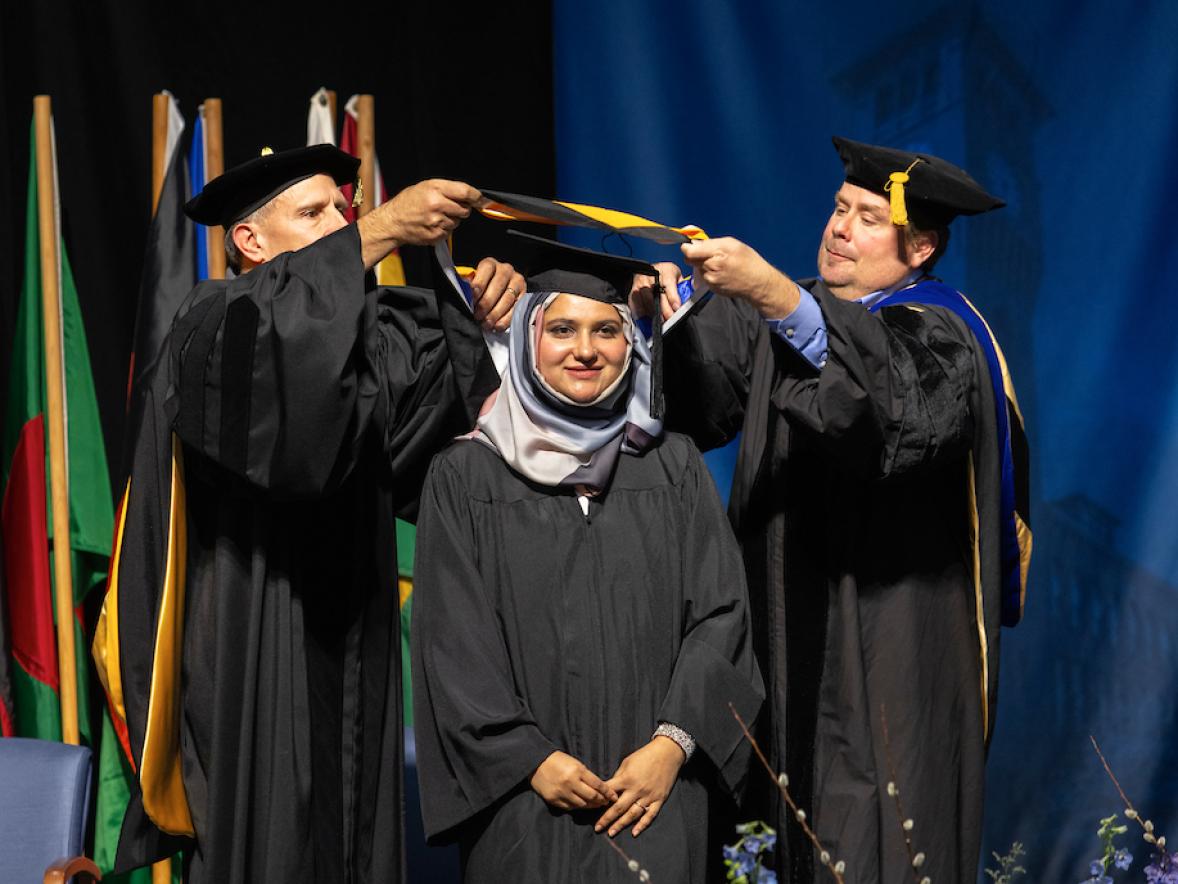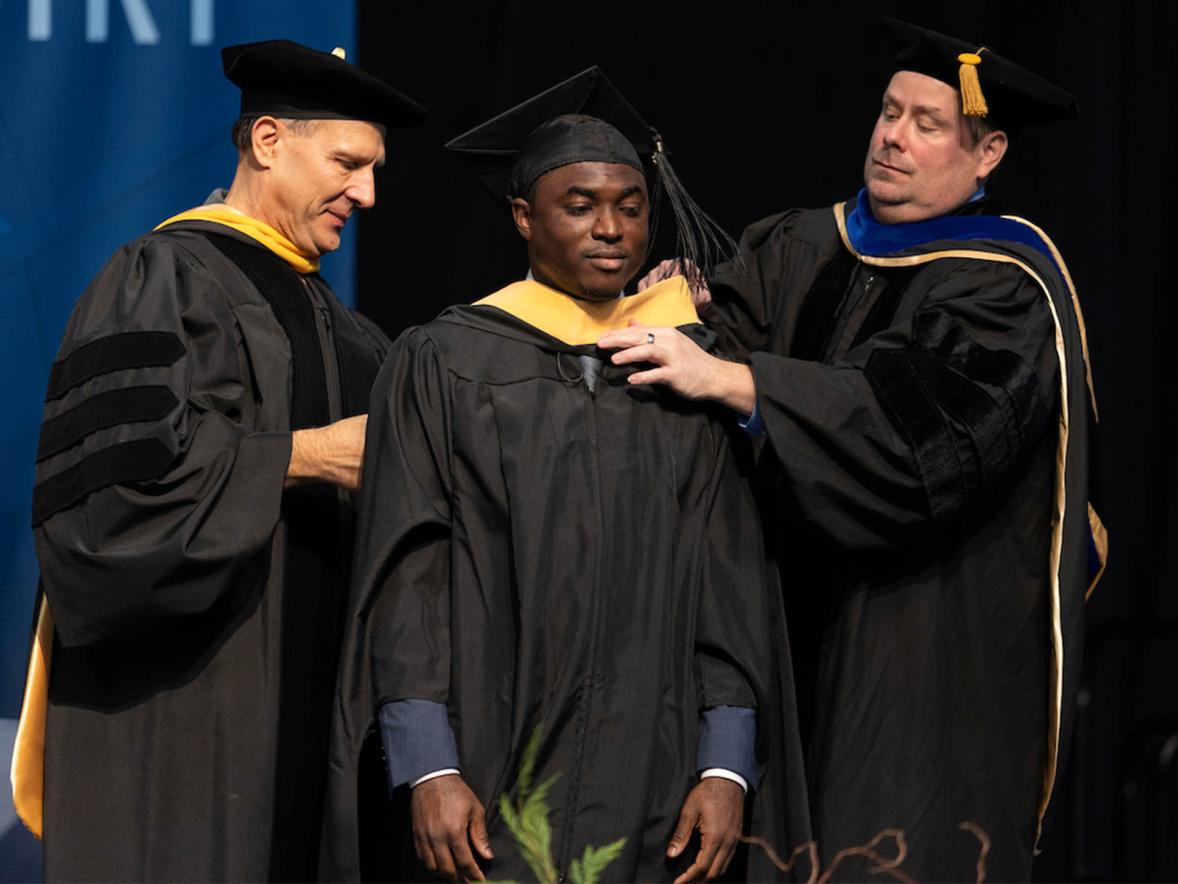A stroll down the aisle of the supermarket or a scroll through your social media feed likely provides plenty of evidence that when it comes to consumer products and nutritional advice, protein is all the rage.
Sales of traditional protein-rich foods like beef have soared, and whey – once an afterthought to the dairy industry – is now a hot commodity. Protein is being packed into everything from waffles to popcorn to soda, and The New York Times recently declared that there is a “protein bar arms race” underway.
And consumers are buying in: Research by Minnesota-based Cargill published earlier this year found that 61% of Americans surveyed reported they boosted their protein intake last year.
This summer, two protein-packed products created by University of Wisconsin-Stout graduate students – one a hard candy made with green algae, the other a celery-infuse cottage cheese – earned accolades. Both research projects were supported by the Evelyn Van Donk Steenbock Endowed Chair grant awarded to Associate Professor Pranabendu Mitra of the university’s Kinesiology, Health, Food & Nutritional Sciences Department.
One of the award winners is UW-Stout graduate student Prachi Sakariya, who is pursuing her M.S. in food science and technology. Prachi has noticed the protein trend, but she also knows about the environmental implications of the dominant sources of protein, both animal- and plant-based. She received the People’s Choice Award at the WiSys Quick Pitch State Final in Madison, part of the WiSys SPARK Symposium, which ran July 23-25.
Another UW-Stout food science and technology graduate student also received recognition for her research this summer. Durga Bhavani Mahankali won second place for an oral presentation she delivered in the product development division at the Institute of Food Technologists’ FIRST Annual Event & Expo in Chicago July 13-16.
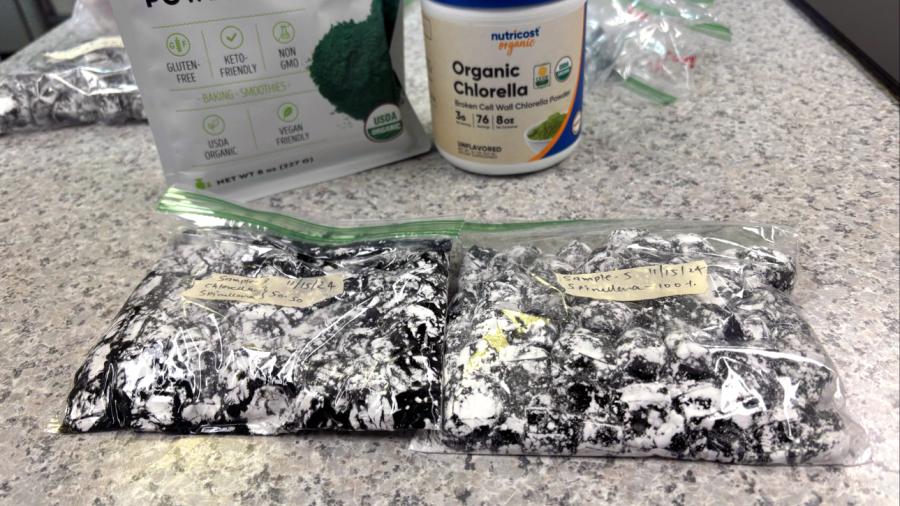
Earth-friendly candy creation
“Whey protein requires a lot of water and a lot of animal milk, and on the other hand plant protein like soy also requires a lot of land, which has resulted in deforestation,” Prachi said. “Right now, water and land use may not seem like a critical concern globally, but over the next few decades, as drinking water and cultivable land shrink, these will become serious challenges. That’s where algae could play a significant role.”
Microalgae such as Chlorella and Spirulina absorb carbon dioxide from the environment, take comparatively little land and water to grow, and have a 60% to 70% protein content, she explained. Yet despite their benefits, microalgae are used in relatively few consumer products.
Prachi aimed to change that by creating a unique product that meets consumers’ desires for both extra protein and sweet treats: a microalgae-infused hard candy she calls an “algae pop.” After experimenting with various recipes, Prachi settled on a 50-50 mix of the two varieties of microalgae combined with sucrose, glucose, lime and citric acid, creating a dark-green candy with a refreshing lime-like flavor.
The project began as an assignment in Mitra’s food product development class last fall. After research, lab work and sensory analysis by 60 campus volunteers, Prachi presented her innovative idea at UW-Stout’s WiSys Quick Pitch competition in early May. She won first place at the competition, held in conjunction with UW-Stout’s annual Research Day.
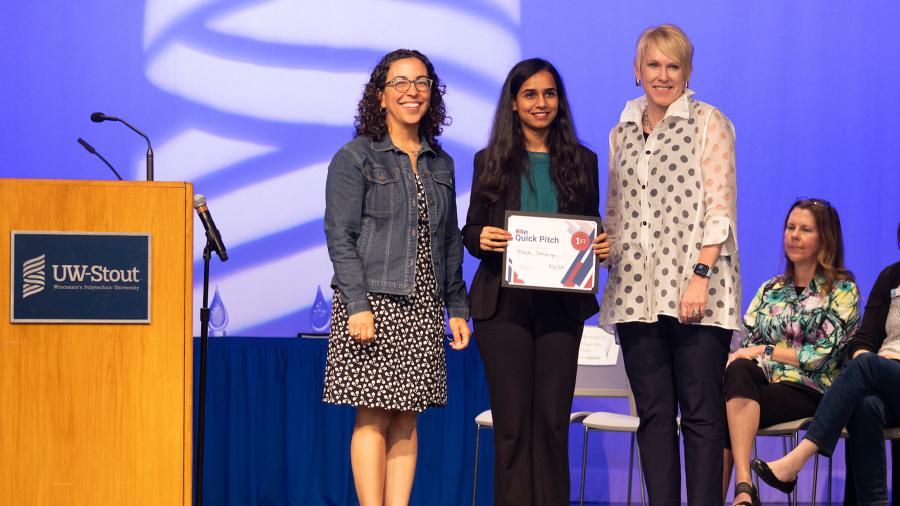
The campus success allowed her to move forward to the WiSys Quick Pitch State Final on July 25. Out of approximately 275 registered attendees, Prachi’s pitch received the most audience votes.
“It was a wonderful experience to win first place at Stout and then to receive the People’s Choice Award at the state-level competition,” she said. “It truly encouraged me, and it was very exciting to present my idea beyond the classroom to professional researchers and innovators.”
While her prior academic career – which includes B.S. and M.S. degrees in her native India – prepared Prachi for the meticulous lab work required for the project, she said that participating in the pitch competition helped her gain valuable experience in presenting her ideas to a broader audience, notably by condensing her research into a three-minute pitch. Prachi credits Mitra with helping her practice and overcome her stage fright.
Currently, her research remains at the lab level, but Prachi plans to further enhance the product by improving the flavor and increasing its protein content. Based on the strong interest shown by attendees at the event, she is now in discussions with a WiSys innovation advisor about future development and potential commercialization.
WiSys is an independent nonprofit that serves as a technology transfer office for Universities of Wisconsin campuses such as UW-Stout.
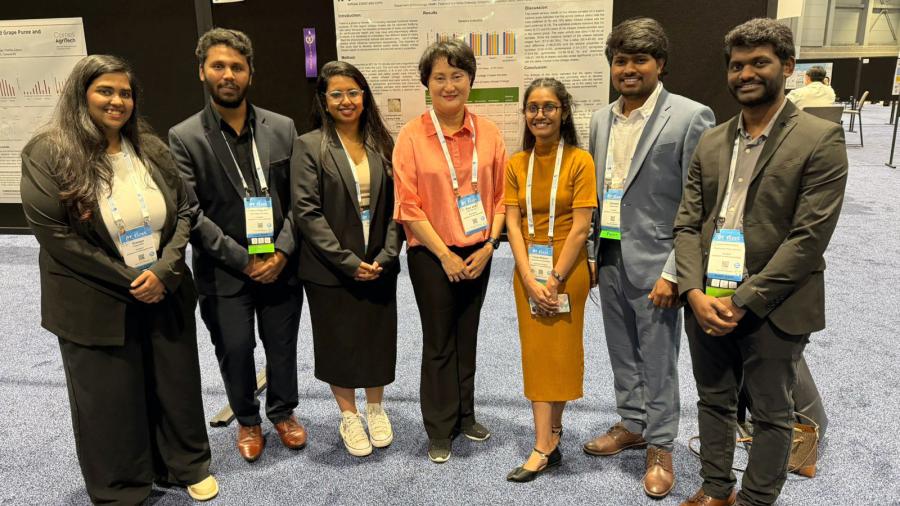
Giving cottage cheese a nutritional boost
Mahankali’s presentation at the IFT expo in Chicago focused on a project – which was also developed in Mitra’s food science and technology research course – that created cottage cheese infused with celery.
Mitra, her professor, described IFT as the “biggest, largest and most prestigious conference for food scientists in the world.” Taking part allows students to network with others in the industry for possible job opportunities.
“Our research mainly focused on making a product that not only tastes good but also offers health benefits,” Mahankali explained. “The idea aligns very well with growing consumer interest in functional foods, which makes our idea stronger.”
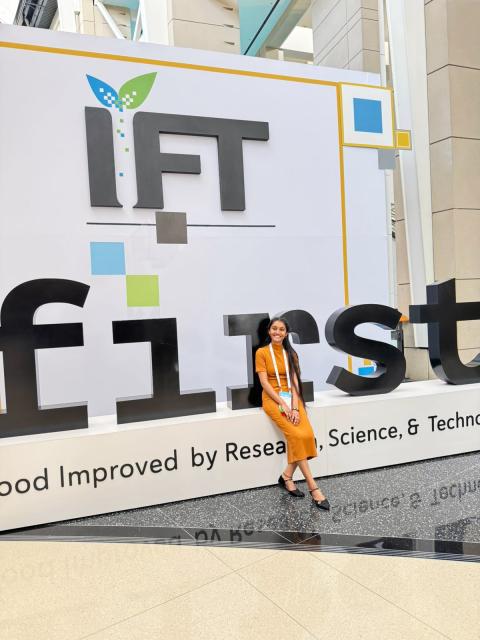
Driven in part by social media buzz, cottage cheese has surged in popularity, she said. Cottage cheese is already low in fat and high in protein, and adding celery infuses it with antioxidant and anti-inflammatory properties because of vitamins A and D. Mahankali said a mixture with 9% celery was found to be most promising as a commercial product.
“One of our professors even mentioned that he would buy the product if it were available on the market,” she said.
Mahankali was the primary investigator on a six-member team that included fellow graduate students Valluru Varun Naga Sai, Durga Siva Rama Krishna Gokavarapu, Sreeya Peri, Sai Sri Mamillapalli and Ganesh Allu. While the entire team was able to attend the conference, it was Mahankali who gave the six-minute presentation to an audience of judges, industry professionals, professors and fellow students. She then answered the judges’ questions about the product’s potential shelf-life and cohesiveness.
“It was a great opportunity to discuss my work in-depth and show how it addresses current trends in functional foods,” Mahankali said.
“It was my dream to attend the IFT conference, and now winning an award on this stage means a lot to me,” she added. “It’s not just mine and my team’s hard work but our mentor (Dr. Mitra) who always motivated and guided us in the right way.”
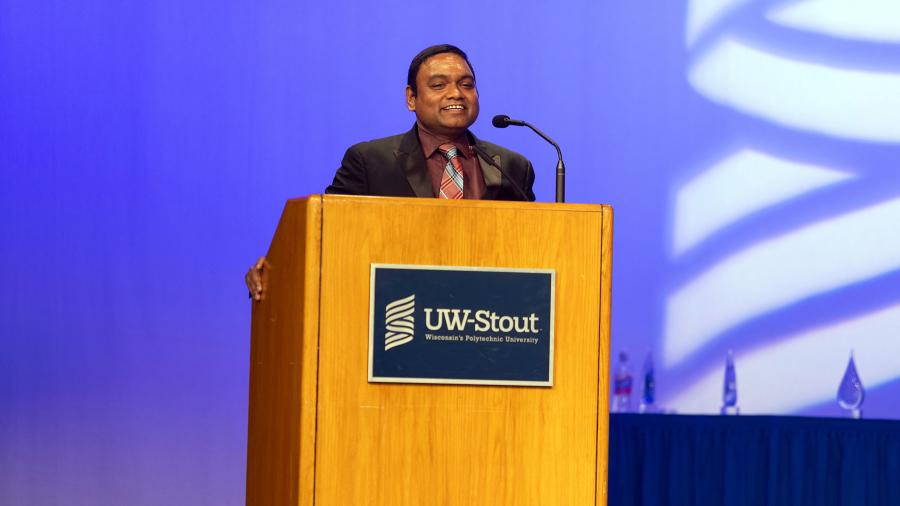
Adding communication abilities to lab skills
Mitra, whose own research focuses in part on environmental sustainability in the food industry, is proud of his students who have had success at the Quick Pitch and elsewhere. In 2023, Stout alumnus Areeba Ali won first place and the People’s Choice Award for “Development of Eco-friendly Milk Whey Protein Isolate Biodegradable Packaging.” And M.S. food science and technology graduate Josh Bernin took second place in the Quick Pitch state finals in 2022 for his presentation, “Developing Protein Rich Higher Fiber and Antioxidant Cranberry Pomace Infused Soy Flour and Rice Flour Blend Extruded Fried Snack.”
Mitra said he strongly encourages his students to take part in competitions such as these. Many food science graduates find jobs in quality assurance or product development, professions that will require them to communicate with coworkers, regulators and customers. Food scientists, Mitra emphasized, need both lab skills and communication skills to have professional success.
“Although you have a strong background in lab skills, if you cannot communicate what you are doing, nobody knows what you are doing,” said Mitra, whose commitment to facilitating student research earned him the annual UW-Stout Outstanding Research Mentor Award last spring.
Food science graduate student Areeba Ali wins WiSys Quick Pitch state title, People’s Choice
Continue ReadingMitra praised Prachi for working hard in the lab to formulate her algae pop as well as outside of class to hone her public speaking.
Likewise, Prachi thanked Mitra, her advisor, for his encouragement, and also highlighted the support of the university’s Office of Research and Sponsored Programs, a partner with WiSys in backing the Quick Pitch competition.
ORSP supports students, faculty, staff and the institution overall in their research endeavors. The office provides funding to support research and creative activity and attendance of research conferences, coordinates UW-Stout’s annual Research Day, and recognizes outstanding research through an annual award program, among other activities.
“The applied research that Stout students participate in not only challenges them to solve real-world problems and develop innovative product ideas, like Prachi’s protein-infused candy, it leads them to develop professional communication skills to share their work broadly – with peer researchers, academia and industry,” said Research Program Coordinator Chela Cea of the ORSP. “As the winner of our campus Quick Pitch competition, held on Research Day each year, we were so proud to have Prachi represent UW-Stout at the state level. Her research, supported by our outstanding faculty, and persuasive pitch clearly resonated with attendees and potential industry partners.”
Prachi, who will begin her second year at UW-Stout in the fall semester, looks forward to continuing work on her product and career goals.
“UW-Stout always pushes students toward not only the theoretical basis but also to learn about the practical version of food science,” she said.





